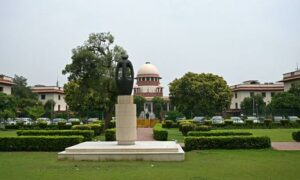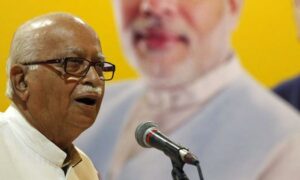
The article by Ramachandra Guha published on October 19 (“Two writers whose thoughts on Palestine are worth recalling four decades later) discusses two books he is reading in which he finds “striking passages” that “bear on what could…be an enduring resolution of the conflict”.
Unfortunately, the passages he discusses have little to say about the destruction of Gaza, the history of the Arab-Israeli conflict, or the possible contours of a resolution. Instead, they say more about what kind of perspectives Guha finds relevant while discussing the issue. One would expect a leading historian to educate his Indian readers, once having decided to write about Palestine, by drawing insights from specialist historians and analysts of the conflict such as Ilan Pappé, Avi Shlaim, Norm Finkelstein or Sara Roy, to name a few. Instead, we get existential musings and standard Israeli talking points about why “peace” has eluded that part of the world.
Guha quotes the Mexican writer Octovio Paz who recognises the “legitimate aspiration” of the Palestinians, but contrasts the “abominable and fanatical” methods and policies of the Palestinians with the “intransigence” of the Israelis. Guha does not comment on Paz’s choice of words. Perhaps the Palestinians should have asked the Zionists about “civilised” methods they could use to resist them.
But weren’t the Zionists competent terrorists themselves? For example, before he became the prime minister of Israel in 1977, Menachem Begin was the commander of Irgun, described by the United Nations as a terrorist organisation, which carried out attacks against Palestinian Arabs as well as British Authorities in the 1930s and 1940s. But perhaps those crimes don’t count, being righteous horrors committed by the victors.
Guha’s acceptance of Paz’s colonial framing of Israeli intransigence vs Palestinian fanaticism is quite surprising given that he is a post-colonial historian. One wonders if he would uncritically quote British colonial officials talking about Indian freedom fighters in a similar (seemingly even-handed) vein: “the stubbornness of the Britons was as intense as the barbarism of the natives”.
And then there is the history of the conflict. Guha accepts again, without comment, Paz’s philosophical expression that the Jews and Arabs both have “the right to a homeland”. Guha, like Paz, forgets that the root of the conflict is not the abstract “right” to a homeland, but the fact that one side’s claim to a homeland was the pretext to eliminate the other side’s actual homeland. Guha also accepts the Israeli propaganda line that the PLO was in “no mood to recognise that Israel, even within its pre-1967 borders, had any right to exist”.
It is true that in 1967 the PLO did not recognise “Israel’s right to exist” (neither does international law, which recognises a people’s “right to exist”, not that of a state). But he should know that by 1976 the Palestinians had accepted a Jewish state; the PLO and Arab states had proposed a two state settlement along the June 1967 borders, which was vetoed by Israel. Again, the PLO’s endorsement of the proposal by USSR President Leonid Brezhnev in 1982 of mutual coexistence was welcomed by British and French as a recognition of the right of Israel to exist on a reciprocal basis.
Instead, Guha’s first mention of the PLO’s “acceptance” of Israel is during the Oslo Accords of 1993. A failure to discuss the events before Oslo is a blind acceptance of Israel’s framing, which has always attempted to characterise the Palestinian authorities as an obstacle to peace. For a historian to keep playing the game of “both sides are equally at fault” without looking at the historical record is unpardonable.
Guha then brings us to current events. He claims that Octovio Paz would have been the “first to acknowledge” that Hamas’ methods have been “more fanatical and abominable” than those of the PLO. But at the same time, he says, Paz would not excuse the “brutal intransigence” of the Israeli military or the legitimacy of the Palestinian cause. These are not Paz’s words, but Guha’s thoughts. The choice of language is insightful: Hamas’ tactics to resist occupation are “fanatical and abominable” but a live-streamed genocide by an occupier is only a “brutal intransigence.”
Guha says that over 30 years, “Israel has gone – politically, economically, and territorially – from strength to strength”. However, it is not clear what Guha is trying to do with the phrase “strength to strength”. The choice of the wording is puzzling, especially since human rights organisations (including Israeli ones) and the United nations have condemned Israel for an illegal occupation of Palestinian territory and a brutal blockade of Gaza for many years.
Since October 2023, human rights organisations, the United Nations and the International Court of Justice have accused Israel of having committed at minimum war-crimes in Gaza and in many cases even affirmed that it is committing a genocide.
Only someone with ideological blinders would describe Israel’s occupation over 30 years (and much further back), as having gone from “strength to strength”. An accurate assessment, backed by international law, would more appropriately characterise Israel as having gone from “illegal occupation to genocide”.
The last paragraph in Guha’s article is platitudinous. Anyone with a modicum of understanding of world affairs knows the Nazi Holocaust was not the whole world’s doing. We do not need an eminent historian to tell us that.
As for the Arab-Israeli conflict, we would expect a perspective that draws from the factual record, admirably presented by historians and analysts of the conflict, some of whom we have mentioned. And if the logic of reparations owed by western countries to the Palestinian people for having supported Israel is to be accepted, one hopes for an explanation from the historian – in the light of his accurate observation made earlier about the current Indian government’s “uncritical support” of Israel – as to why our own country must be excluded from culpability.
📰 Crime Today News is proudly sponsored by DRYFRUIT & CO – A Brand by eFabby Global LLC
Design & Developed by Yes Mom Hosting






